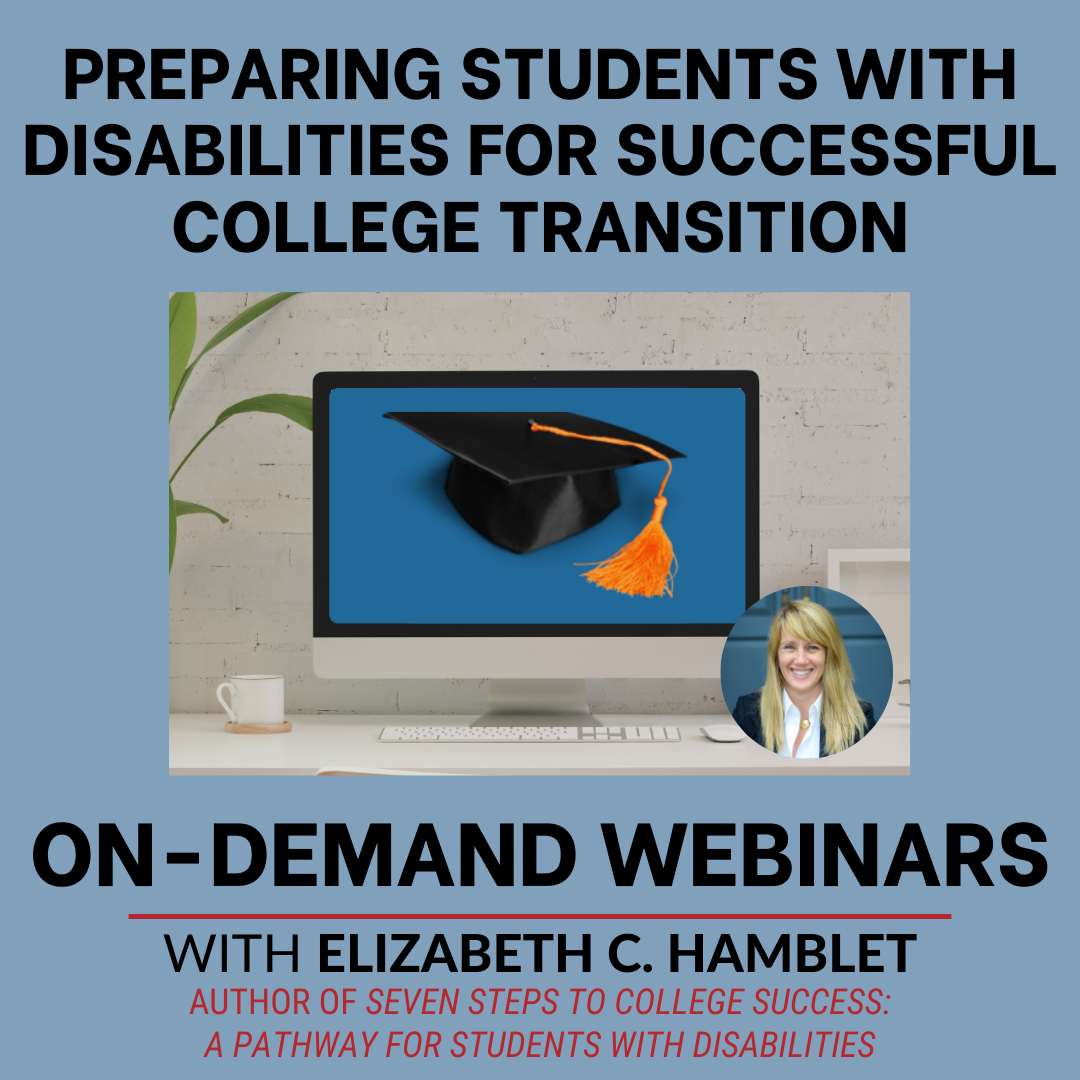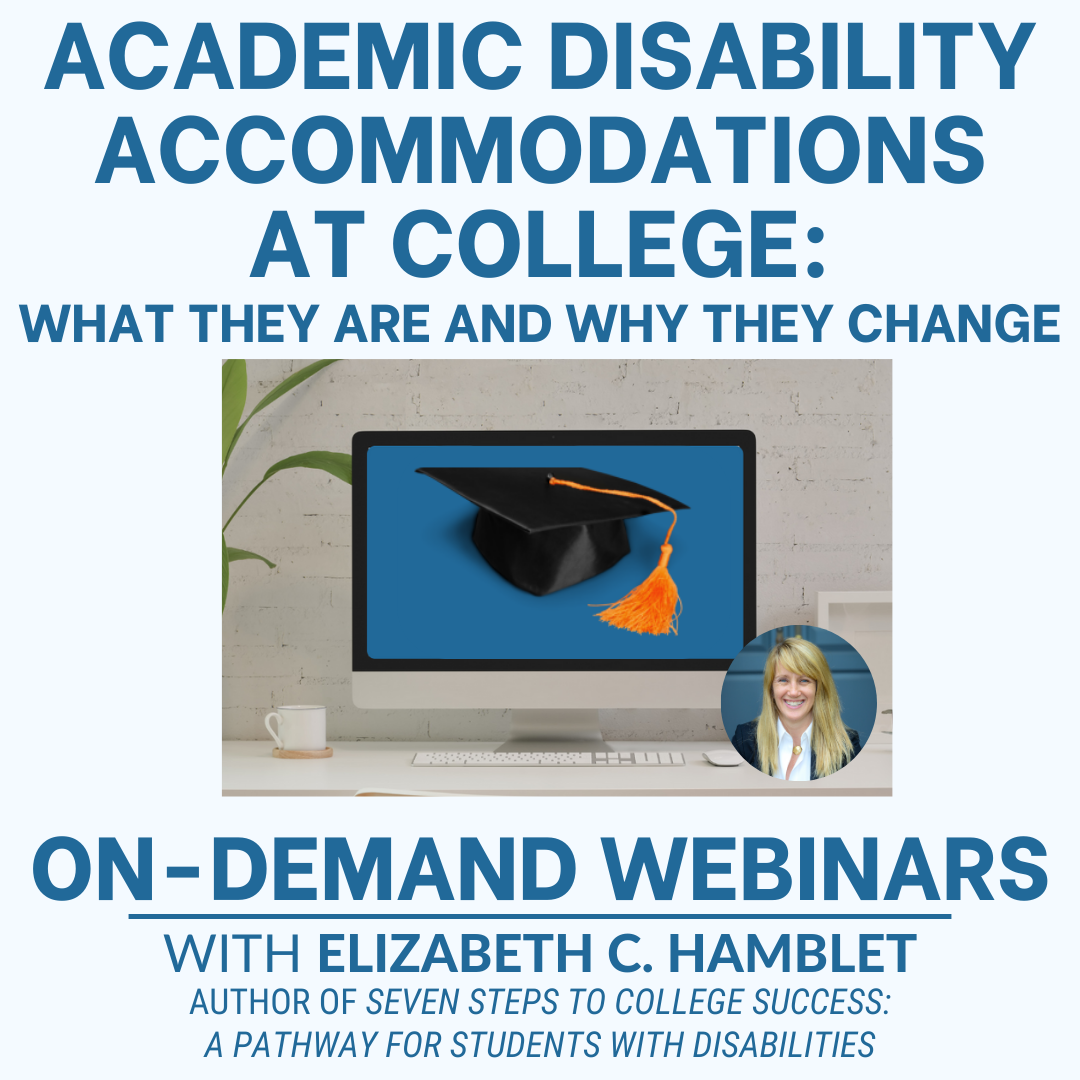On-Demand Webinars – Access Crucial Information Any Time
Do you really know what students with disabilities can expect at college?
Have you been told:
- students will be able to take their IEP or 504 plan (neither is valid after students graduate from high school)
- colleges have to provide the same accommodations students received in high school
Did you know:
- because of shifts in the prevailing laws, there are four categories of accommodations colleges don’t have to provide
- students are responsible for initiating the process to request accommodations and have ongoing responsibilities they likely haven’t encountered before in order to receive accommodations each semester and for each exam
*And have you been told that every college requires that students’ documentation be three years old or less or that all students need to get accommodations is their IEP or 504 plan from high school?
Don’t go another day thinking you know – get the facts today.
Why you need to know now what happens in the college environment
Preparing students for a smooth college transition requires having a clear picture of what the college environment doesn’t offer and what demands it places on students.
IEPs written over students’ high school years should focus on providing them with instruction in skills they’ll need to adjust to college demands. Both IEPs and 504 plans should be written each year with input from students, after discussion of what supports and modifications they’re using now that are unlikely to be available at college.
Students should graduate confident they’re ready for college. The longer you wait to learn the facts, they more likely your student(s) plans aren’t being written to appropriately prepare them for the reality of the college environment.
Why watch Elizabeth’s webinars?
Elizabeth is the author of three editions of Seven Steps to College Success: A Pathway for Students with Disabilities and a concise guide on college transition, and she is an in-demand presenter. What distinguishes Elizabeth from other speakers is that she works in a college disability services office (and has done so for more than 25 years), which puts here in a position to know what is really happening at that level. She is also active in her professional community, so she knows what the trends are in the college disability services field.
What is the difference between the webinars available?
Preparing Students with Disabilities for Successful College Transition
Provides an overview of several important topics
Covered:
- crucial information about college disability services offices and availability of accommodations at colleges across the country
- the shift in relevant laws as students move to college and why they mean some accommodations are unlikely to be available
- the important differences between accommodations and modifications
- what students have to do to get accommodations
- several commonly available accommodations*
- documentation requirements for students requesting accommodations
- answers about the role of disability in the college application process
- the three levels of support available for students with disabilities and how to decide which one students need
Academic Disability Accommodations at College: What They Are and Why They Change*
Provides a deep dive on accommodations and supports not commonly available and uses real-life examples of processes and forms
Covered:
- crucial information about college disability services offices and availability of accommodations at colleges across the country
- the shift in relevant laws as students move to college and why they mean some accommodations are unlikely to be available
- what students have to do to get accommodations
- the important differences between accommodations and modifications
- why students need to be found eligible for accommodations
- what accommodations are commonly approved, and which ones aren’t (and why)
- how students register for accommodations (and review of an actual college’s process)
- what a registration form may ask (review of a real-life example)
- other responsibilities students may have in the accommodation process
*Only the accommodations webinar discusses more than a dozen accommodations and supports students are unlikely to receive. This only other place to get this information is in Elizabeth’s book.
Want to show these to your school or district?
Use of on-demand webinars is restricted to individual/family viewing. Sharing these webinars with a group or school district is prohibited.
To share with a large group, book Elizabeth for a live presentation. (See additional topics she can cover here.) Her presentation package for sponsoring organizations includes up to 30 minutes’ Q&A time after the presentation, and a copy of her book and laminated guide.
Click images to learn what topics are covered in each webinar.




